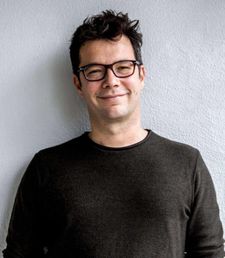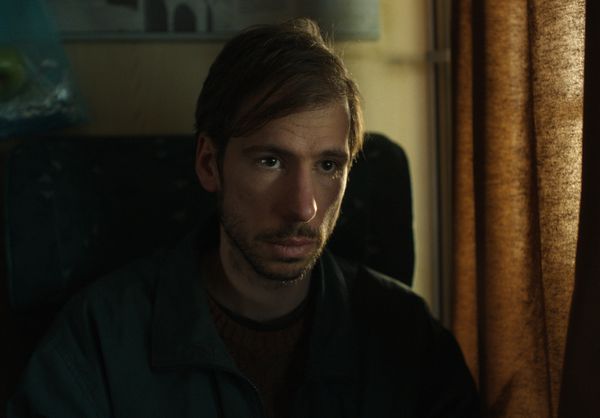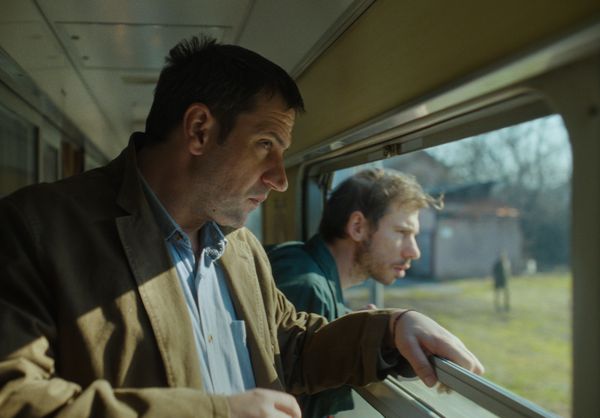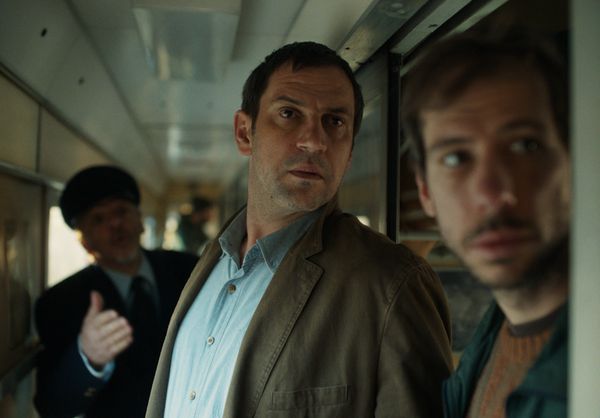How did you come across the story of Tomo Buzov, was it something you were already aware of?
 |
| The Man Who Could Not Be Silent director Nebojša Slijepčević: 'I try to shoot as little as possible extra and try to have to make as few decisions in the editing room as possible. ' |
But five years ago, my producer Daniel Beck sent me a newspaper article written by Croatian columnist Boris Dežulović, who is fantastic and covers mostly difficult topics from the region. And he wrote about Tomo Buzov, how he's forgotten completely, although his act is heroic, and how this he was not forgotten because he is one of the many people who did heroic acts, but because he was one of the rare people who made such heroic acts, and he did not fit into any nationalistic narratives. He was a Croat, but he lived in Serbia as an officer in the Yugoslav army, but he retired from Yugoslav army when it started the aggression, when it became, basically, the Serbian army in the early Nineties. Then he gave his life protecting Muslims in a train.
So he was not like a typical hero for any nationalist narrative. For Croats he was a traitor because he was living in Serbia. For Serbs, he was a traitor because he quit their army when they started the aggression. And for Muslims, he was not a traitor, but he was not the ‘right’ kind of victim because he was not Muslim victim, and in this era of nationalism, each nation tries to prove that they are the biggest victim, and the others are the biggest criminals. So it's easy to forget victims from other nations and that's how Tomo Buzov got forgotten.
 |
| Silvio Mumelaš in The Man Who Could Not Remain Silent. Nebojša Slijepčević: 'I think it is very important for all of us to think about ourselves. Are we really as righteous as we think we are?' |
So I immediately said: “Okay, fantastic story. But let's do two things. First, let's not make a story about the hero. But let's make a story about the guy who was sitting next to the hero. And the guy who is who is not a hero at all, he's just a regular person, as most of us are. And if it was an American film, then probably it would be a superhero kind of person in the centre of the film, but this is not an American film. I wanted the audience to think that they are following the hero because we all love to identify with heroes in the film. And that's that was my intention to lead the audience on the wrong path. To make them identify with the main character who is handsome, who is strong, who is a righteous character, but then we see he is not actually, he is a fake. I think it is very important for all of us to think about ourselves. Are we really as righteous as we think we are? And what do we do when a situation that puts us at risk really comes?
In a way there has never been a better, or perhaps I should say worse, time to be a bystander - we all get to be bystanders in all sorts of conflicts now that we never would have done back in 1993. Now they are passing by our open computer windows every second of every day.
NS:Exactly. We are close to World War III, that's unfortunately, quite obvious. But also, we see the whole of Europe leaning to the right. We have to see how the European elections this Sunday will go. But in Croatia, we also have this leaning to the extreme right. And we are witnessing on a daily basis, different initiatives to reduce minority rights, but also to reduce women’s rights. Women are not, of course, a minority in society, but they are a political minority, because they are underrepresented and we have a stronger pressure in Croatia, for example, to forbid, abortion. And it's not happening, fortunately, for now, but this is a big question, especially for us men, what do we do if it comes to fruition? Do we look at the floor and pretend that it has nothing to do with us? Or do we give support to women?
Turning to the making of the film, it has very high production values. How hard was it to get hold of a train and what were the challenges of shooting in the confined spaces of a carriage?
NS:It was a big challenge. Fortunately, and I'm not saying it as as an obligation to them, I believe I had the best producers imaginable because they were backing me up completely and they knew from the first day it will be expensive film and we made a deal we are not going to make it if we don't have right budget because we don't want it to look bad and they somehow collected money invested their own money they did all these kinds of things to make my work possible. And then we had to find the right train and then we found one wagon which was ready to be dismantled.
It had no electricity inside, you know, it couldn't be driven on the open rail tracks but somehow, we succeeded to repair it enough to look authentic on the film. And we filmed in the main station in Zagreb. We had a green screen on one side of the train and then on the other side we had the sidings. From the window, it looks quite bad, so we didn't have to do much on the outside. And we had like 50m or 100m of the rail tracks where we could ride the train. Soin the last shot, the train is actually moving, which was very important to have this feeling of the location.
Inside it was very tricky, but I was preparing for four months with a camera. So we did the blocking, I did it first with a cell phone, then with a photo camera, and then we brought the real camera. I have the first shot for example, which is quite long, two minutes of quite complicated camera movement - I have it filmed in 10 different versions with members of the production team standing in for the actors. We used, I think, 100% of what the location was giving us. The last shot was very tricky, I wanted to do this long circular move of the camera, where it shows the faces in the carriage, so we had to dismantle part of the one seat and the grip guy was lying on the floor, literally, and we had a camera which was remotely controlled. It was tricky but I had a great crew, and it all went smoothly. We were prepared.
It's interesting that you talk about preparation, because you come from a documentary background, which is in many ways marked out by spontaneity, because you follow a story. Whereas in this case, you're very much more in control of it. Was it nice to be so in control of the narrative for a change?
NS:I know this sounds strange but for me, this was the easiest film I have done because I had so many great people working with me and helping me along the way. With my last documentary Srbenka, 70% was done just by me carrying a camera on one shoulder and sound recorder on the other shoulder and two tripods each in one hand, and running around.
 |
| Nebojša Slijepčević on shooting in a confined space: 'Inside it was very tricky, but I was preparing for four months with a camera' |
But also, what I learned on documentaries was to prepare, because in documentaries, it's very easy to somehow lose control, running after each shot and after each character. So to avoid that, you must really be mentally prepared for what you want to achieve in the shooting days. So when I do documentaries,I make a storyboard in my head, the day before the shooting, and then, of course, I improvise, but I improvise from that starting point. And I know I'm not going to shoot wide shots, I will do just the close ups and I will look for that. I try to shoot as little as possible extra and to try to have to make as few decisions in the editing room as possible.
When I transferred that to this film, the result was that we used all the shots that we shot. The storyboard was so precise that we did not have any extra.
So do you think now you're going to move more away from documentary towards fiction now? Has this given you a taste for making features like this as well?
NS:Obviously, my plans changed a little bit after this success because I did not expect it. Of course,I don't know who in the world can expect to win the Golden Palm, So for now, yes, I’ll prioritise fiction so my next film or two will be fiction features.. But that doesn't mean that I'm not drawn to documentaries.I have an idea for documentary as well. But I enjoyed working on this film and somehow now, I want more of this process of talking with actors.
And this good result probably will make it easier for me to finance the next film, which when you come from Croatia, is not easy. Can you finance your film or not is defining your career, not your talent, not your working habits. So now, when this problem is hopefully solved, I can, I will have a chance to work.
But one of the projects I’m preparing is a fiction film, but it’s connected to documentaries, because it will be a satire about making a documentary in Europe. It draws on my experience of 20 years of making documentary stories that I lived through and witnessed that I think are worthy of making into a fiction. The working title is Documentaries, a fiction film called Documentaries, I find that amusing.
Other things have also opened up, I got an offer to make an adaptation of a quite famous Croatian book by a modern author that was one of the best sellers which is something I find as a great challenge. Now different projects are opening up and I must keep my head cool and to see what's realistic for me.






















